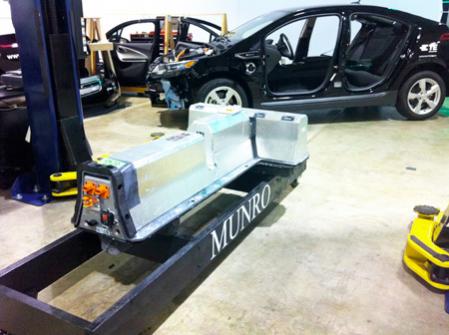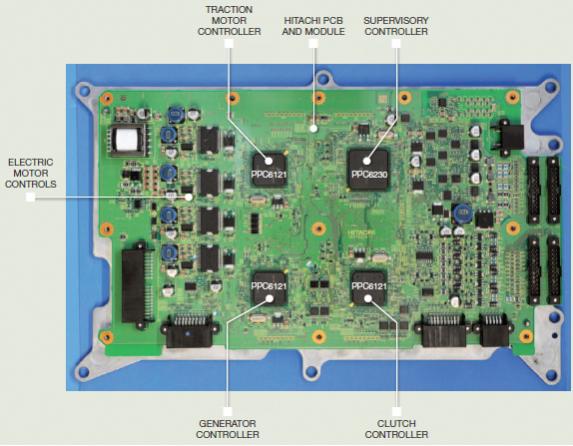One DAC panel session that I am looking forward to attending is the Chevy Volt Teardown. This takes place at 1.30-2.30pm on Tuesday June 5th at the DAC pavilion (aka booth 310). Al Speier will be talking about a teardown that they did at Munro Associates where he is a senior associate. Unfortunately they won’t actually be tearing down a Chevy Volt on the show floor. That would be a clever trick in an hour for a start. But you can see Al do it in just 4 minutes on a time-lapse video.
 The battery is huge, 435lbs, shaped in a big T under the rear seat and under the tunnel between the front seats (who knew a front-wheel drive car would have a tunnel for the non-existent prop-shaft!). It has its own cooling system. I have read that it produces 360V and has a capacity of 16kWhr (although it only has 10kWhr available for use since it never completely discharges or completely charges the battery). A horse-power is roughly a kW (actually 1HP=0.75kW) this means around 20 horse-power for an hour. But a normal car’s petrol engine has around 80-250 horsepower, admittedly at the tacho redline. According to Wikipediathe peak power of the electrical motor is 111kW, which is in that range, at which rate it would exhaust the battery in less than 10 minutes. Hmm. I guess when just cruising along the power demands must be an order of magnitude less. The all electric range is apparently 25-50 miles so less than an hour at freeway speeds which would fit. For reference, a gallon of gas contains around 36kWhr so three times the usable capacity of the battery. Gas really is incredibly energy-dense.
The battery is huge, 435lbs, shaped in a big T under the rear seat and under the tunnel between the front seats (who knew a front-wheel drive car would have a tunnel for the non-existent prop-shaft!). It has its own cooling system. I have read that it produces 360V and has a capacity of 16kWhr (although it only has 10kWhr available for use since it never completely discharges or completely charges the battery). A horse-power is roughly a kW (actually 1HP=0.75kW) this means around 20 horse-power for an hour. But a normal car’s petrol engine has around 80-250 horsepower, admittedly at the tacho redline. According to Wikipediathe peak power of the electrical motor is 111kW, which is in that range, at which rate it would exhaust the battery in less than 10 minutes. Hmm. I guess when just cruising along the power demands must be an order of magnitude less. The all electric range is apparently 25-50 miles so less than an hour at freeway speeds which would fit. For reference, a gallon of gas contains around 36kWhr so three times the usable capacity of the battery. Gas really is incredibly energy-dense.
 Apparently 40% of the value of the vehicle is in electronics with over 100 electronic control units (ECUs) of one sort or another. That’s a lot of compute power.
Apparently 40% of the value of the vehicle is in electronics with over 100 electronic control units (ECUs) of one sort or another. That’s a lot of compute power.
The Volt charges the battery like any hybrid through regenerative braking. And, as you probably know, it can be charged from a 110V outlet or a special 220V charging station. Plus, it has a regular gasoline engine that also can charge the battery. Unlike a hybrid, only the electric motors drive the wheels, the gasoline engine only drives a generator to drive the wheels and recharge the battery.
Munro’s website is here.
Share this post via:







TSMC N3 Process Technology Wiki